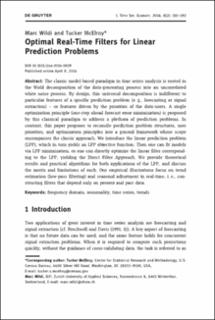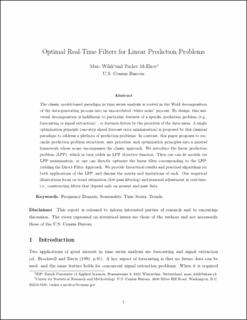Please use this identifier to cite or link to this item:
https://doi.org/10.21256/zhaw-4906Full metadata record
| DC Field | Value | Language |
|---|---|---|
| dc.contributor.author | Wildi, Marc | - |
| dc.contributor.author | McElroy, Tucker | - |
| dc.date.accessioned | 2018-11-30T08:14:07Z | - |
| dc.date.available | 2018-11-30T08:14:07Z | - |
| dc.date.issued | 2016 | - |
| dc.identifier.issn | 2194-6507 | de_CH |
| dc.identifier.issn | 1941-1928 | de_CH |
| dc.identifier.uri | https://digitalcollection.zhaw.ch/handle/11475/13385 | - |
| dc.description | Erworben im Rahmen der Schweizer Nationallizenzen (http://www.nationallizenzen.ch) | de_CH |
| dc.description.abstract | The classic model-based paradigm in time series analysis is rooted in the Wold decomposition of the data-generating process into an uncorrelated white noise process. By design, this universal decomposition is indifferent to particular features of a specific prediction problem (e. g., forecasting or signal extraction) – or features driven by the priorities of the data-users. A single optimization principle (one-step ahead forecast error minimization) is proposed by this classical paradigm to address a plethora of prediction problems. In contrast, this paper proposes to reconcile prediction problem structures, user priorities, and optimization principles into a general framework whose scope encompasses the classic approach. We introduce the linear prediction problem (LPP), which in turn yields an LPP objective function. Then one can fit models via LPP minimization, or one can directly optimize the linear filter corresponding to the LPP, yielding the Direct Filter Approach. We provide theoretical results and practical algorithms for both applications of the LPP, and discuss the merits and limitations of each. Our empirical illustrations focus on trend estimation (low-pass filtering) and seasonal adjustment in real-time, i. e., constructing filters that depend only on present and past data. | de_CH |
| dc.language.iso | en | de_CH |
| dc.publisher | De Gruyter | de_CH |
| dc.relation.ispartof | Journal of Time Series Econometrics | de_CH |
| dc.rights | Licence according to publishing contract | de_CH |
| dc.subject.ddc | 003: Systeme | de_CH |
| dc.title | Optimal real-time filters for linear prediction problems | de_CH |
| dc.type | Beitrag in wissenschaftlicher Zeitschrift | de_CH |
| dcterms.type | Text | de_CH |
| zhaw.departement | School of Engineering | de_CH |
| zhaw.organisationalunit | Institut für Datenanalyse und Prozessdesign (IDP) | de_CH |
| dc.identifier.doi | 10.21256/zhaw-4906 | - |
| dc.identifier.doi | 10.1515/jtse-2014-0019 | de_CH |
| zhaw.funding.eu | No | de_CH |
| zhaw.issue | 2 | de_CH |
| zhaw.originated.zhaw | Yes | de_CH |
| zhaw.pages.end | 192 | de_CH |
| zhaw.pages.start | 155 | de_CH |
| zhaw.publication.status | publishedVersion | de_CH |
| zhaw.volume | 8 | de_CH |
| zhaw.publication.review | Peer review (Publikation) | de_CH |
| Appears in collections: | Publikationen School of Engineering | |
Files in This Item:
| File | Description | Size | Format | |
|---|---|---|---|---|
| 2016_Wildi-McElroy_Real-time-filters-linear-prediction-problems.pdf | Version of Record | 2.61 MB | Adobe PDF |  View/Open |
| 2016_Wildi_Optimal_real_time_filters_for_linear_prediction_problems.pdf | Accepted Version | 545.29 kB | Adobe PDF |  View/Open |
Show simple item record
Wildi, M., & McElroy, T. (2016). Optimal real-time filters for linear prediction problems. Journal of Time Series Econometrics, 8(2), 155–192. https://doi.org/10.21256/zhaw-4906
Wildi, M. and McElroy, T. (2016) ‘Optimal real-time filters for linear prediction problems’, Journal of Time Series Econometrics, 8(2), pp. 155–192. Available at: https://doi.org/10.21256/zhaw-4906.
M. Wildi and T. McElroy, “Optimal real-time filters for linear prediction problems,” Journal of Time Series Econometrics, vol. 8, no. 2, pp. 155–192, 2016, doi: 10.21256/zhaw-4906.
WILDI, Marc und Tucker MCELROY, 2016. Optimal real-time filters for linear prediction problems. Journal of Time Series Econometrics. 2016. Bd. 8, Nr. 2, S. 155–192. DOI 10.21256/zhaw-4906
Wildi, Marc, and Tucker McElroy. 2016. “Optimal Real-Time Filters for Linear Prediction Problems.” Journal of Time Series Econometrics 8 (2): 155–92. https://doi.org/10.21256/zhaw-4906.
Wildi, Marc, and Tucker McElroy. “Optimal Real-Time Filters for Linear Prediction Problems.” Journal of Time Series Econometrics, vol. 8, no. 2, 2016, pp. 155–92, https://doi.org/10.21256/zhaw-4906.
Items in DSpace are protected by copyright, with all rights reserved, unless otherwise indicated.